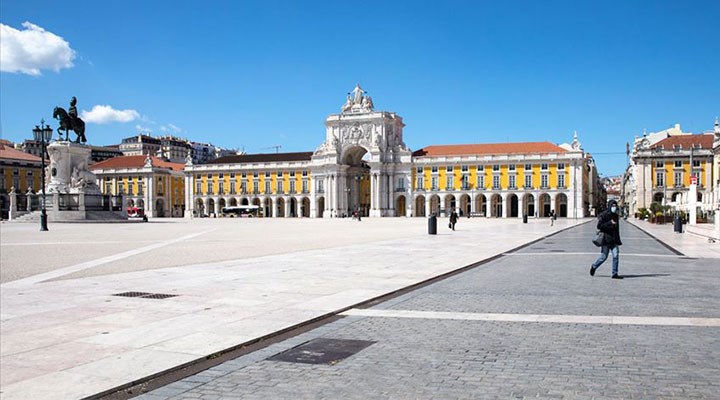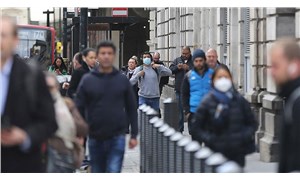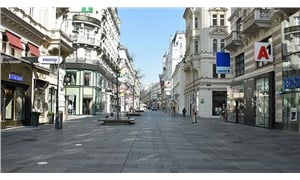"Immigrants and blue-collar workers are hurt by the sudden drop in their income"

UĞUR ŞAHİN
In Portugal, more than 32,700 people have been affected by Coronavirus, while 425 have died.
According Dr. Luís Capucha, immigrants, blue-collar workers and cleaning companies are hurt by the sudden drop in their income, not because of COVID-19.
“For those who are already vulnerable, unemployment and poverty are going to get higher and higher,” Capucha said.
Dr. Luís Capucha, interviewed by Uğur Şahin for BirGün.
For the first time since 1974 the 'State of Emergency' was declared on 19 March in Portugal. What happened during these two-week State of Emergency?
The State of Emergency was decreated twice, consecutively, between March 19 and April 2. Most of the measures taken reinforced responses already underway: closure of Universities (being autonomous entities, they took measures of strong contingency, including the end of face-to-face classes since 12/13 April) and schools (from 13 April); prohibition of all events that involved gatherings; restaurants reduced to a quarter of capacity; closed commerce , with the exception of goods considered essential ( food - including supermarkets -, pharmacies, newspapers and games), beginning of the preparation of the lay-off and the rules for tele-work; calls for coining and quarantining people who test positive. The state of emergency implied very restrictive measures to leave home (just to work, go shopping (essential goods), take care of family members, practice sports (respecting distances) and walking pets, situations that were strictly controlled by the police), reinforcement of response conditions in the national health system (the resources acquired exceeded the needs - for example, twice the number of ventilators), construction of field hospitals and means of reinforcing mandatory quarantine measures, closing the borders with Spain and reducing links with the outside world operational matters (material transport and Portuguese repatriation); reinforcement of measures to support lay-off workers and their extension to self-employed workers and small employers; very restrictive rules of entry into food sales spaces (supermarkets); beginning of the rule that implied the use of masks, as they became available; cancellation or reorganization of major events and national celebrations of a historical, cultural or religious nature; prohibition of movement between municipalities except for work and health purposes, duly attested); the start of distance educational programs in schools and tele-schools for basic education (from May 18th, face-to-face classes for 11th and 12th grade students will be resumed for the preparation of national university entrance exams, the rest being eliminated ).
Sanitary waists imposed on braces with a much higher than average incidence. Completed isolation (Ovar).
A single controversial measure was taken, the release of just over 1,000 prisoners in certain criminal situations (related to the type of crimes and the time needed to fully serve their sentence), in order to prevent the pandemic from entering the prison system, what has been achieved
The number of infected people first registered on March 2, rising rapidly to around 800 a day in late March. In early April, there was a day with more than 1,500 confirmed infected people, but the values stabilized at around 500 throughout the month. Then it dropped in early May to values around 250 daily. At that time there was a talk about the end of the State of Emergency, and it is not known if because of that, the numbers went back up to the 500 daily after May 6.
However, on this date, there were a total of 26,182 confirmed cases (for a population of just over 10 million habitats), resulting in 1,089 deaths and 2076 recovered. On the 8th of the same month, 842 people were hospitalized and in intensive care units (ventilated) 127. The trend of both indicators is downward.

Dr. Luís Capucha
In fact, Portugal is one of the most affected countries by the debt crisis in Europe. However, relatively successful and inclusive measures were taken and applied against the pandemic. How were measures and aids found reflection on public?
In the 2015 elections there was an unequivocal rejection of the austerity policy imposed by the troika formed by the European Commission, the European Central Bank and the IMF. The government formed on the basis of an agreement between the left-wing parties allowed to restore some of the most serious measures - raising the minimum wage, restoring salaries, pensions and social benefits - but maintained a strong pressure on public expenditure - with strong repercussions on the systems of education and health - which led the country to achieve, in the five years of that government (and the next one, elected at the end of 2019), a sharp reduction in public debt, the balance of the State accounts, with the deficit registering a superhavit in 2019, and with a low economic growth, but always above the European average. For this reason, there has been, so far, a willingness to face the increased costs of combating the pandemic and trying to sustain employment and the economy.
The monthly value of the measures launched by the government to relaunch the economy and combat the crisis has been, on average, 1,340 million Euros.
Contributed to this consensus was the fulfilled commitment to involve all Parties and Social and Civil Partners both in accessing first-hand information to data on the progress of the pandemic, and on the measures that were taken. The Social Communication, including the main televisions, also followed a path to fight fake news and inform according to technical suggestions from health authorities.
There is a strong belief that the economic and employment crisis that will follow the pandemic crisis may return more austere measures, but without the need to return to austerity. This conviction is associated with a pressure strategy at European level in order to demand solidarity between the states least affected by the crisis and those most affected. The European issue is currently at the center of the political debate agenda in Portugal.
As of today, Portugal has started the "gradual normalization process". What is your observation of the latest situation in the country, is it the time for such normalisation? How did the "gradual normalization process" begin? Next, how do people spend time in quarantine?
Starting with the second part, it should be noted that the first warnings from public health authorities about the danger of the pandemic (they had already devalued it in January and February, “so as not to generate panic”) were not taken very seriously. Images of hundreds of thousands of people were reported, (a lot that ended up on Saturday March 14) in good weather, going to the beach. The next day the police acted and prevented this from happening again. At the same time, images of Italy and, soon after, Spain began to be seen. From then on, confinement was followed with practically no exceptions. Work at home, study (schools “filled” students with “Homework”) and the playful use of the internet and television were the main changes and simultaneously ways of adapting people to isolation. Industry officials report that internet usage increased by 49% during the state of emergency. The overwhelming majority of people started to go out just to buy food - to spaces longer than traditionally - and basic hygiene activities such as practicing outdoor sports and walking pet animals - for a very short time according to the usual standards. In fact, people were afraid of being contaminated and protected themselves. Others also protected themselves but also volunteered to provide certain services, such as buying food and medicines, for older neighbors. With the end of the state of emergency approaching and the news that COVID_19 would be more or less under control, there were more “holes” in the fulfillment of the “civic duty of confinement”.
After April 2, the so-called “civic duty of confinement” was maintained, but return to work was authorized whenever teleworking is not a viable solution, especially in industry; small shops, including restaurants, can be opened, but with very strict rules for the use of masks and physical distance, with a preference for the take-away; services such as dentists and others were able to open, also with the same type of rules, but activities such as gyms and public shows and meetings that involve public agglomerations do not; there’s also the possibility of concluding the championship of the first football division behind closed doors; you can walk in public spaces, but always with a mask; this is what has been called the progressive opening of the economy and public life; public transport continues to carry only a number of passengers that ensures physical distance, but always involving the use of masks (non-compliance can result in heavy fines; testing has been greatly increased, particularly in risky places such as homes elderly and workplaces.
Whenever the police intervened and set up operations to avoid excesses - for example, trips to the beach or others of a casual/leisure nature - they were respected and accepted without major problems. It is no longer the same tight surveillance as the previous period, but it is still quite effective.
The army was only called upon to intervene to set up emergency hospitals, centers designed to isolate people from places with a significant incidence of cases of infection, and to disinfect public spaces such as schools, kindergartens and day-care centers (to prepare their reopening) or other sanitary actions
How was the level of public support to the measures taken by the government? How important was the public support and cooperation in the success? Would you also tell us a bit how do people spend time in quarantine?
There was a wide national consensus around the measures taken, which included the President of the Republic (center-right), the Government (center-left) and the opposition, from the extreme left (PCP and BE) to the right (CDS) , passing through the largest opposition party, the PSD (center-right). The Catholic Church set an example, following the line of Pope Francis, by emptying religious ceremonies from public even during Easter, and determining that this year pilgrims will not be allowed to gather in the celebrations of the apparitions in Fatima. During Ramadan the mosque divisions and Mohammedan structures followed the same path. The media followed a path of reflecting the official guidelines, avoiding the circulation of fake news and acting with a pedagogical sense. There were several solidarity initiatives, from the distribution of food, purchases to deliver to the elderly, provision of food to the poor and the ones affected by the paralysis of the companies in which they worked, sometimes in a precarious way (which implied who had been left without access to support measures, when they were precisely those who needed it most. Many other companies (footwear, clothing, moulds, IT, etc.) have converted to manufacture protective materials, at no cost or as has already been said, the duty of confinement has been fulfilled globally, to which the images arriving from Italy and Spain are not strange, as well as the reaction to the positions of Trump and Bolsonaro, as well as dictators from other countries in the world that rejected the idea of precaution and speed in adopting measures against the pandemic.
On another level, more political and ideological, the affirmation of the primacy of public policies and the State returned (workers in the health, protection, sanitation and logistics systems are seen as heroes, moreover opposed to the attitude of private services that refused to enter the fight against the pandemic or that they declared only to do it in exchange for very high commercial costs, for example for carrying out tests). On the other hand, the importance of society and social behaviours became very visible, which opposed the primacy of the individual over the collective, and instead affirming the individual's need to protect, need and depend on collective behaviours. The debate about Europe and its usefulness or mission has again become the subject of heated debate in the media
Speaking of quarantine; In many places, the low purchasing power of the people and the lack of a saving or an additional budget that can combat the virus makes it impossible for the poor to obey the quarantine conditions in the long term. So, what should be said about Portugal on this point? Can you give information about the situation of lower income groups in particular with regard to their level of protection against pandemic?
There is really not much to say about it. No financial support measure was created for families and communities in poverty, the most noticeable law the government has implied is the fact that landlords cannot evict people of their rented homes until early September . However, as mentioned, there was mobilization for the development of charitable actions, namely through the voluntary supply of food, almost always involving civil society organizations linked to the churches.
The largest municipalities, such as Lisbon and Porto, have created “emergency centers” to accommodate homeless people who have lived on the street before, and others who have found themselves in this situation due to the sudden drop in income. However, it should be noted that in none of these Centers, nor in any case, positive cases were detected among the homeless.
The general perception that remained among the population highlights three traits: the vulnerability of the elderly; the irrelevance of the social class to the pandemic; the sharp increase in poverty and extreme deprivation due to the economic and employment crisis.
If we come to our main subject, according to the research conducted by the National Statistical Office (ONS) in England, where at least 28 thousand 446 deaths were recorded due to coronavirus, mortality rates are higher in the poor regions of the country. Britain is just one example; it is possible to give similar examples. For example, Brazil; indigenous (aboriginal) population were most affected by Covid-19 here. How is the situation for Portugal? How different your case in this regard? Who were the most affected group(s) in Portugal?
That assumption cann0t be assumed in Portugal. On the contrary, some of the poorest regions were hit by the pandemic much more softly. The distribution of the registered cases in the 8th of may is as follows: North: 15,809 cases, 639 deaths; Center: 3,564 cases, 214 deaths; Metropolitan Area of Lisbon; 7,093 cases, 233 deaths; Algarve: 345 cases, 13 deaths; Autonomic Region of Madeira: 90 cases, no deaths. The two poorer regions, Alentejo and the Autonomic Region of Azores, registered, respectively, 232 cases, 1 death and 135 cases, 14 deaths.
The risk associated to the pandemic was mainly associated to certain specific conditions (mainly, leaving in nursing homes - indeed, according to the> Secetary of State of Health informed that, in the 7th may, 14% of the 351 nursing homes for the elderly had registered infected people, both workers and users - or sheltered claimers of asylum) or specific municipalities, not necessarily the poorest. Groups like the disabled people and migrants didn’t appear to be particularly vulnerable.
How is the coronavirus impact on such peripheral locations, suburbs and ghettos where poverty is intense in your country? And also in the factories? At this point, there are also questions such as "Is it virus or poverty killing"? What is your approach?
The main problem of poor neighbourhoods is poverty, and not a particular incidence of the pandemic. None of the municipalities that had to be closed with a cordon sanitaire correspond to a particularly poor environment. But unemployment without protection besides minimum income (which will arrive only in the next year for those who did not claim it before) impacts very strongly those communities. Depending on the region, these communities include immigrants (more in Lisbon than in Porto and the North), manual workers in construction and manufactory and people working in cleaning of companies and other organizations that are closed), Roma people and others in such categories are the ones that are suffering from a dramatic break down in income, but not particularly from COVID_19.
There are reported cases of workers from some factories and other working organizations that were strongly affected, and in some of them there was a high percentage of immigrant workers, but that does not change the main picture.
Everyone who applied for a residence in Portugal was allowed to enjoy the rights enjoyed by citizens until 30 June. The purpose of this arrangement was that, as far as I know, citizens of foreign countries could benefit from health services during the pandemic like Portuguese citizens in the country. How would you judge this policy?
I would say that it is a fair policy and that the claims against strangers in general and particularly against people who applied for a residence in Portugal recently, namely those who required for asylum, has not been contested so far but by a very small part of the Portuguese people. They do have access to health care. But sometimes there were found problematic situations, due eighter to false believes and fears. This is the case, for instance, of people who did not search for help from health services afraid of being infected, or of being identified as immigrants without permission. But the first situation was also found within a considerable part of the Portuguese population, and the second one has no material reasons. In the cases of people who required asylum there were some problematic situations. Those who were waiting for the conclusion of their process were living in hostels hired by the state, and there was turbulence and even violence when positive cases were detected and the candidates to a refugee status refused to stay isolated and insisted to leave the confinement to go to work in their illegal jobs (of course, offered by Portuguese and foreigners “employers” of slavery wok, mainly in the intensive agriculture sector). The news has noticed the violence and abuse of some situations between the refugees ones against the others and the interventions of police.
Portugal has developed quite differently from the neighbouring country Spain in terms of incidence and death rates in the Covid-19 outbreak. So why is Portugal overcoming the Covid-19 crisis much lighter than its neighbour Spain? What would be your comment on this issue?
As said before, when the theme of the pandemic emerged, the health authorities in Portugal and in Spain devalued the danger of the virus. But, when it came, portuguese government adapted rapidly some important measures, like closing schools (the universities decided to do the same autonomously before) and appealing to confinement. The first confinement was in place in Portugal relatively soon, while in Spain they came later. Besides, the acceptation of confinement and other extraordinary measures, as well as the adhesions to new practices like telework ant learning at distance, was strongly stimulated by the news about what was happening in Italy and, afterword, in Spain, the USA and Brasil. The appeal to be together (in the same fight) by staying at home was largely accepted. This permitted the hospitals and health services staying always above the urgent necessities (less than one half of the vent pipes available in hospitals was used, while the news coming from Spain and Italy spoke about doctors having to decide between two or more people who was going to die). Watching some funerals on TV was a strongly dissuasive factor to discourage disobeying the rules and recommendations.
Finally, what happened in Italy, Spain and the USA in the course of this pandemic has revealed that neoliberalism is bankrupt. What is your opinion on this failure? How would this crisis would affect economic and social policies in here? When the pandemic ends, what awaits Portuguese citizens, especially for the poor?
Bankruptcy of neoliberalism was announced after de crisis of 2017/2008 and the sovereign debts crises that followed. And yet, the world did leave a big crisis go into waste. The example of countries like Portugal, that could recover their social and economic trajectory only after cutting with the neoliberal prescription of austerity, did not affect sufficiently the correlation of forces between the tragic neoliberal ideologies and powers, and a view of society and economy based on the development of human rights.
The future is very uncertain. It is true that, in a situation of panic, the State, the value of common good and solidarity, and the demonstration of the fallacy of the premise of individuals against societies (like Tatcher proposed), were lifelines during the pandemics. But things are far from a deep change.
In Europe, nationalism is prevailing against the ideal of a community of partner states. The interests of the big world companies are untouched. The ones who suffered and are going to continue to suffer are small business owners. They and their employees are in a dramatic situation and it is not clear at all if they are going to supported against poverty and destitution. In Portugal, some support is being given to companies and workers. But this is clearly insufficient and the beneficiaries seem to be the ones that were already better prepared. The unemployment is going to rise again dramatically, and poverty will be strongly deepened, mainly among the ones that were already vulnerable. No measures have been thought for addressing the poor problem and the signs coming from countries in Europe, including Spain, are not positive. The idea of basic income has just been refused.
Artificial intelligence brought some opportunities to invent new ways of working and access employment, for learning, for combating the pandemic with data analysis, to promote scientific research with a strong impact on health. But is also is showing how it can help dictators to control citizens, employers to destroy regulated work, and deepening inequalities in society and economy. The future is open, but social justice is requiring lots of energy, intelligence and efforts to combat neoliberalism.
The owners of all benefits from neoliberalism, big Banks and super companies are quite now. Some preparing to attack after the crisis, others perhaps a little more conscientious of the importance of equality and environment balance. But I would say, in resume, that neoliberalism is not in a situation of bankruptcy, but quite the opposite the values of justice have now even better reasons and evidences to go on and keep on fighting.






